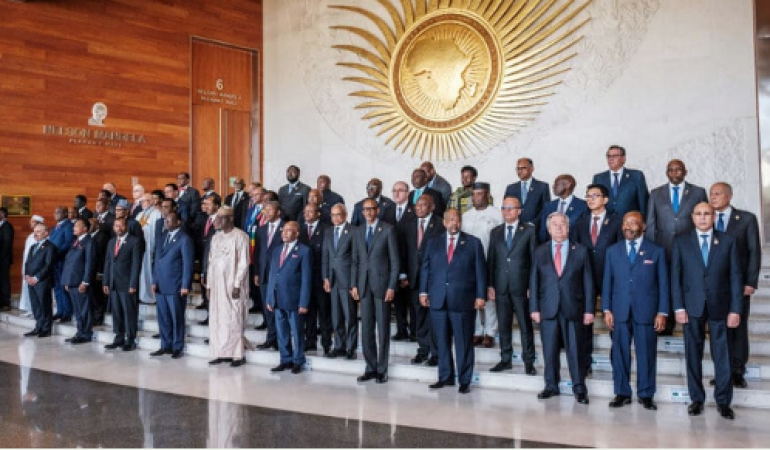
Addis Ababa: Israel charged Iran with using Algeria and South Africa to arrange for the expulsion of a senior diplomat from the African Union summit on Saturday.
The incident took place on the first day of the summit, where leaders are debating a number of issues confronting the continent, such as a record-breaking drought in the Horn of Africa and deadly violence in the Sahel region and the eastern Democratic Republic of the Congo.
In a video making the rounds on social media, security personnel are seen leading Sharon Bar-li, Israel's deputy director general for Africa, out of the AU assembly, which began on Saturday in the Ethiopian capital Addis Abeba.
The incident, according to a spokesman for the Israeli Foreign Ministry, was "severe," adding that Bar-li was "an accredited observer with an entry tag."
Also Read: New Education System, trends and modern pedagogy
"It is saddening to see the African Union being held hostage by a small number of extremist states, such as Algeria and South Africa, which are motivated by hatred and under the control of Iran," he continued. The incident comes after a protracted argument over Israel's membership in the 55-member bloc.
Moussa Faki Mahamat, the head of the African Union Commission, made the 2021 decision, which resulted in a rare disagreement within a group that values consensus. Strong member states, particularly South Africa, loudly denounced the decision. The African Union has not indicated whether it will be discussed at its summit this year, which was supposed to discuss whether or not to withdraw accreditation and create a committee to look into the matter.
The person who was "asked to leave," according to an AU official, was not invited to the meeting; Aleli Admasu, the Israeli ambassador to the African Union, was the only one who received a non-transferable invitation. That the person in question would misuse such a courtesy is regrettable, the official said.
When asked about Israel's accusations, Vincent Magwenya, a spokesman for South African President Cyril Ramaphosa, responded, "They must substantiate their claim."
All eyes are on the AU to see if it can broker ceasefires in the Sahel and the eastern Democratic Republic of the Congo, where M23 rebels have seized large areas of land and sparked a diplomatic spat between Kinshasa and Rwanda's government.
which is charged with supporting the rebels. Leaders of the seven-nation East African Community pushed for the withdrawal of all armed groups from occupied areas in the eastern DRC by the end of next month at a mini-summit on Friday. African leaders were exhorted by UN Secretary-General Antonio Guterres to "act for peace."
Also Read: "I don't support regime change in Russia": Emmanuel Macron at Munich meet
The recent increase in violence by armed groups in the eastern Democratic Republic of the Congo as well as the growth of terrorist organisations elsewhere, he said, are both deeply concerning.
"The peacekeeping systems are breaking down." The 1.4 billion-person continent, according to Guterres, faces many difficulties, including "an unfair and dysfunctional global financial system that denies many African countries the debt relief and concessionary financing they need."
As he took over the rotating one-year AU chairmanship from Macky Sall of Senegal, Comoros President Azali Assoumani, the head of the tiny, 900,000-person archipelago in the Indian Ocean, echoed his views. In his acceptance speech, Assoumani demanded the "total cancellation" of all African debt, but he did not specify how this would be accomplished.
Additionally, Guterres declared that the UN's Central Emergency Response Fund would release $250 million to "support some of the most vulnerable people" worldwide, including those in the Horn of Africa who face the threat of famine due to the ongoing drought.
Junta-ruled Although they are unable to attend this weekend's summit due to their suspension from the AU, Mali, Burkina Faso, and Guinea have sent diplomats to Addis Abeba to advocate for their readmission.
Hard-won democratic gains are "disappearing in some countries," Guterres warned. Faki asserted that the bloc needed to devise fresh plans to fend off the erosion of democracy.
Sanctions imposed on member states as a result of unconstitutional political changes do not appear to have the desired impact.
For the system of opposition to the unconstitutional changes to be more effective, Faki continued, "it seems necessary to reconsider it."
Also Read: 'We are not the countries that make stories...', says Jaishankar
The summit, which was largely held in secret, was also intended to hasten the implementation of the 2020-launched African Continental Free Trade Agreement, or AfCFT.
By removing nearly all tariffs, the AfCFTA seeks to increase trade between African countries by 60 percent by 2034 from its current level of only about 15 percent.
But because of disagreements between governments over tariff reductions, implementation has fallen far short of that objective.